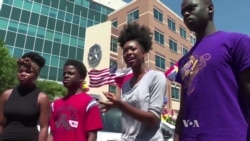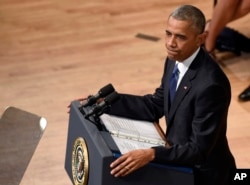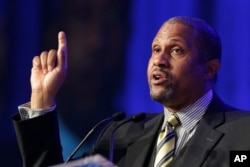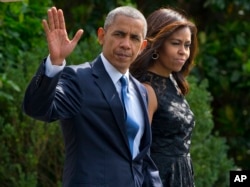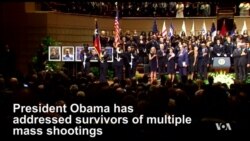Last week’s high-profile incidents of gun violence involving race have raised questions about how the nation’s first black president, Barack Obama, has responded. Some prominent African-Americans have been critical.
The president addressed the issue of race head-on Tuesday at a televised memorial service for five slain police officers in Dallas, Texas. Obama said the overwhelming majority of police officers do an incredibly hard job, and they do it professionally and fairly. But he said no one is entirely free from racial prejudice, and that includes police officers.
“America, we know that bias remains. We know it, whether you are black, or white, or Hispanic, or Asian, or Native American, or of Middle Eastern descent," he said. "We have all seen this bigotry in our own lives at some point. We’ve heard it at times in our own homes. If we’re honest, perhaps we’ve heard prejudice in our own heads and felt it in our own hearts.”
Cellphone video last week of two African-American men being shot at point-blank range by white police officers, one in Baton Rouge, Louisiana, and the other one in Falcon Heights, Minnesota, already had many Americans upset and on edge. On Thursday, an African-American gunman opened fire on a peaceful protest in Dallas, killing five white police officers and leaving many Americans shocked and scared.
The White House said Obama spoke with the families of the two black men killed by police in Minnesota and Louisiana on Tuesday while on his way to Dallas. A statement said Obama called family members of Alton Sterling and Philando Castine, offering his and the first lady's condolences on behalf of the American people for the deaths of their loved ones.
The president asked Americans not to dismiss or deny the experience of fellow citizens who are taking to the streets to protest frequent episodes of police killings of minorities. He said: “So if you’re black, you’re more likely to be pulled over or searched or arrested; even more likely to get longer sentences; more likely to get the death penalty for the same crime.”
The president called on Americans to have an “open heart,” and to honor all those slain by working together to forge consensus and fight cynicism.
African-Americans critical
Ahead of Tuesday’s memorial service in Dallas, several prominent African-Americans criticized Obama’s response to the shootings, including PBS TV show host Tavis Smiley.
In an editorial for USA Today, Smiley chastised the president for planning to visit Dallas, where the police officers were shot, but not also visiting Louisiana and Minnesota, where the two African-Americans were killed by police last week.
“These shootings are connected, if not forensically, most certainly for a grieving country, a nation wrestling with what to do about our gun culture," Smiley wrote.
Smiley went on to note that Obama had spoken eloquently Saturday, during a trip to Poland, about the "endangerment of black lives in America," but "he needs to visit both Minnesota and Louisiana. To avoid either is to misread the pain that his most loyal constituency, black folk, are feeling in this present moment.”
African-American author and academic Cornel West also criticized Obama’s response to the shootings of black citizens in Louisiana and Minnesota, commenting in The Washington Post: “I thought it was weak. He’s always got to explain to white America how black people are feeling. Black people don’t feel as if we’re being treated unequally — it’s a fact that we’re being treated unequally.”
Planting a seed
With anxiety levels still high, Obama has struck a determinedly patient and optimistic tone. He said the country has made significant progress, and he rejected any suggestion that the country is returning to the racial strife of the 1960s.
Asked about his legacy on race relations at a news conference Saturday, the president said he would leave that to the history books, but he expressed optimism that things would be better for his two teenage daughters, Malia and Sasha, and for their children.
Obama maintained that mending America’s troubled race relations would take time, saying: “We plant a seed, so that others might someday sit in the shade of that tree.”
President Obama's statements on mass shootings during his presidency:




